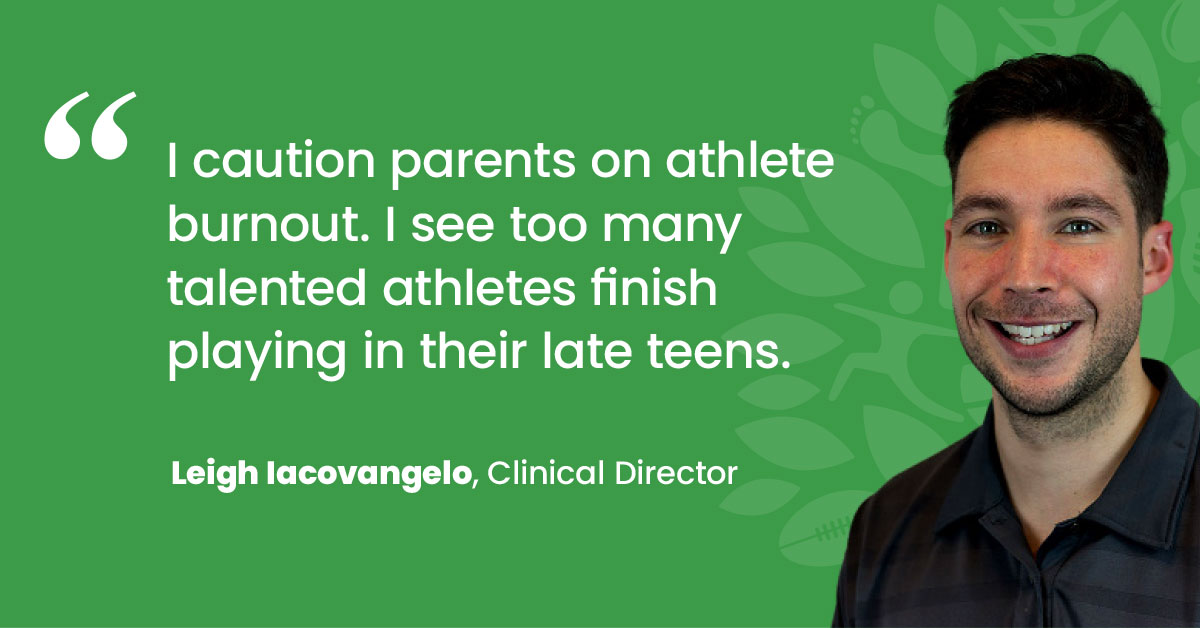Team Q&A: Leigh Iacovangelo

Recently we sat down with our Clinical Director and Senior Physio Leigh Iacovangelo to chat about his background, why he became a physio, his experience with elite sport and managing load and injuries in younger athletes.
Born and raised in the southeastern suburbs, he now calls Knoxfield home and with his wife, Chenelle, has a young boy called Levi, who is nearly one.
What inspired you to become a physiotherapist?
My love for sport and performance in sport. Dr Peter Brukner (sports physician) was Men’s VP at my hockey club during my adolescent years and we continue to share a friendship to this day. I very much admired his career and the influence he had on managing players and injuries.
What sports did you play when you were in high school?
I was a pretty active kid. My chosen sports were hockey, football and cricket.
What sports do you play today?
I continue to play competitive hockey and have also taken up golf.
You have worked with plenty of elite sports teams, tell us about that …
I have been very fortunate to work with Hockey Australia’s Indoor Hockey Program since 2015. This has included the 2015 and 2018 World Cups in Germany, as well as the European tour in 2017 and tour of Austria in 2019. It is always a privilege to work with Australia’s best indoor hockey players and I have been very fortunate to establish many friendships with coaches and support staff. The biggest highlight was the 2018 World Cup where Australia finished 4th, our best result since the tournament began in 2003.
You’re currently working with Melbourne United, what’s that involve?
I have had a part-time physiotherapy role at Melbourne United since 2019. My main role is player preparation for their main training session. This normally involves injury prevention strategies such as taping as well as pre-training treatment to facilitate optimal training performance. Post-training we focus on recovery such as ice-baths and assessment and treatment of minor injuries and soreness. I’m fortunate to work alongside some great physio minds in Steve McAdam and Nick Harrison.
What advice would you give to any aspiring athlete?
Develop the training structure and consistency in your training to set up long term success. Talk to qualified professionals and coaches who can help you in this area
What advice would you go to the parents of aspiring athletes?
I caution parents on athlete burnout. I see too many talented athletes finish playing their sport in their late teens. It’s important to seek professional advice around loads and different ways to cross-train to keep variety and player interest. I would also suggest just talking to one trusted and professional coach about a structured pathway to success.
What are common injuries you see in younger athletes?
I see many preventable injuries consistent with overtraining or inconsistent training, including Achilles and patella tendinopathy, bone stress reactions and patella-femoral pain syndrome to name a few. Of course, there are common acute injuries, such as ankle sprains, contusions and quad, calf and hamstring muscle strains.
Although uncommon, we do see the occasional avulsion fractures in our adolescent population, flagging the importance of a thorough assessment. An avulsion fracture occurs mainly in kicking and sprinting sports when a small segment of bone is pulled away from the main bone by the tendon while growth plates are still developing.
How do you manage the load of athletes during the season?
There is not one recipe when managing an athlete’s training load and therefore consultation with your athlete is important. I consider many factors when managing training loads in season and will program accordingly.
Depending on the sport, I may ask the athlete to rate perceived exertion levels at training to help progress or regress training volume and intensity accordingly.
Other factors I consider when managing load include player experience, past training loads that have been successful/unsuccessful, current soreness, past injuries, gym and strength-based experience to help determine how robust and therefore how tolerant they are to load. I would always consider tapering before tournaments and recovering appropriately or programming load to peak perform at various times of the season, such as finals.
How important is the mental aspect in performance and recovery?
The mental aspect of performance is critical and it is pleasingly to see many more adolescent athletes seeking the professional services of sports psychologists. Sports psychologists can also assist with a range of facets including anxiety and improving motivation levels to help adhere to the extra demands of sport including recovery, rehabilitation and diet.
Book an appointment
If you are an aspiring athlete or a parent looking for professional advice book an appointment with Rise Health Group today.
